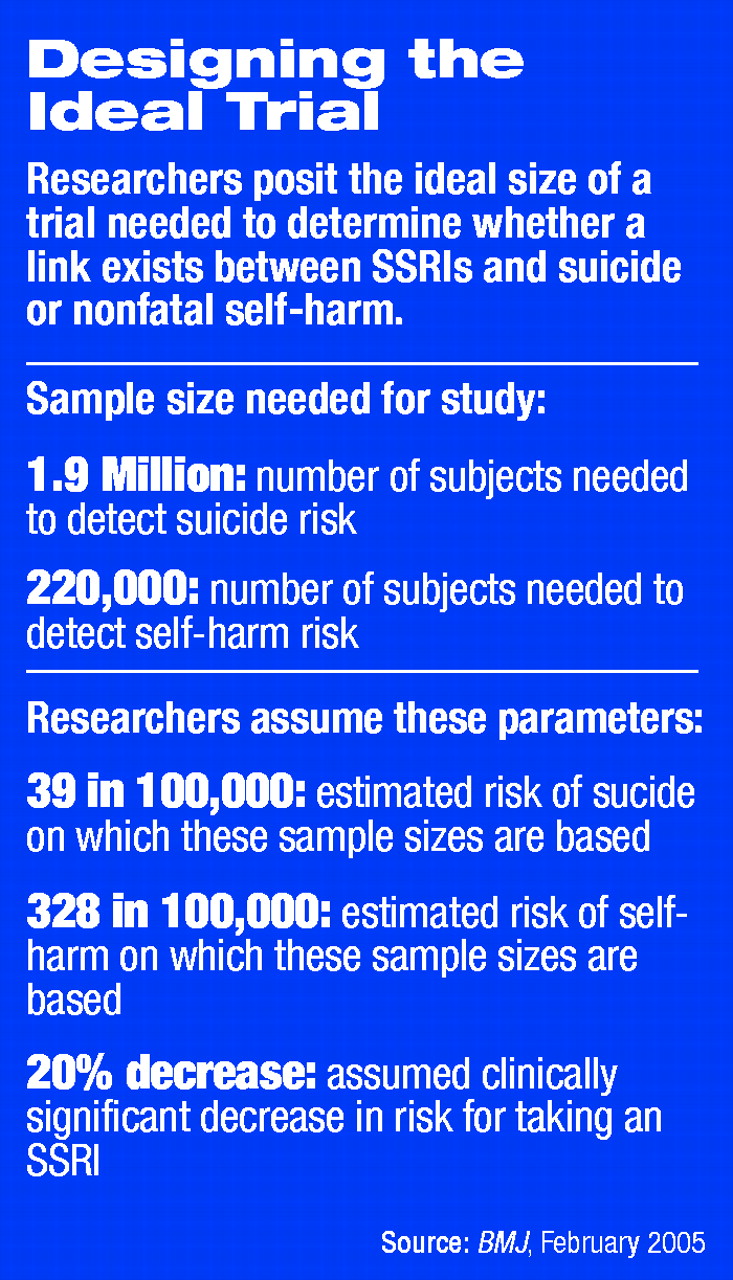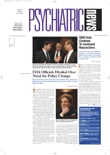It's been a turbulent year for antidepressants—especially the serotonin reuptake inhibitors—with intense interest in the quest for the answer to one seemingly straightforward question: do the drugs' benefits outweigh their risks?
As a recent series of studies clearly demonstrated, even after nearly two years of analysis of clinical trials data by researchers and regulators across the globe, the answer remains elusive.
Three of four new analyses appeared in the same issue of a top-tier journal. On February 18, BMJ (formerly the British Medical Journal) published the three reports, along with an editorial, and issued a press release declaring, “Suicidal behaviour caused by antidepressants cannot be ruled out.”

The press release prompted stories in major daily newspapers the following morning. However, the newspapers didn't quite agree on the studies' outcomes. The Washington Post, for example, ran a front-page story with the headline “Drugs Raise Risk of Suicide: Analysis of Data Adds to Concerns on Antidepressants.” By contrast, the New York Times ran with“ Antidepressant Safety Debate May Include Adult Patients.” That article succinctly captured the debate, noting, “The new findings are mixed, and apparently contradictory.” It also noted that the results might be encouraging to both patient advocates, who believe the medicines are dangerous, and to pharmaceutical companies, which have spent the last two years defending the safety of their products.
At the end of the day, even after reading newspaper accounts and viewing nightly newscasts discussing the studies, many physicians were still left wondering whether the latest round of research meant they should be more—or less—worried about prescribing antidepressant medications.
What the Studies Found
The first of the three studies in BMJ was led by Dean Fergusson, M.D., a scientist researcher at the Ottawa Health Research Institute's Clinical Epidemiology Program in Ottawa, Canada. Fergusson teamed with fellow Ottawa senior scientist Paul Hebert, M.D., and David Healy, M.D., a professor of psychological medicine at the University of Wales College of Medicine in Bangor, Wales, U.K., two previously outspoken critics of the safety profiles of antidepressants. Healy has also been a expert witness for plaintiffs in lawsuits alleging that antidepressants caused patients' suicides or violent acts.
The Canadian Institute of Health Research funded the work.
Fergusson and his colleagues analyzed 702 clinical trials involving more than 87,000 patients with depression and other disorders. They found that patients taking SSRIs were twice as likely to attempt suicide as patients taking placebo in the trials (odds ratio 2.28).
Second, the analysis found no increase in risk when only the number of completed suicides of patients taking SSRIs was compared with those taking placebo.
Finally, no significant differences were noted in the risk of suicide attempt in patients taking tricyclic antidepressants (TCAs) compared with those taking SSRIs.
The second study published in BMJ reviewed data from more than 40,000 adult patients in 477 clinical trials that drug companies had submitted to the U.K.'s Medicines and Healthcare Products Regulatory Agency (MHRA). The agency had undertaken a safety review of trials comparing SSRIs with placebo in adults with depression and other mental disorders following its review of clinical trials data involving depressed children and adolescents.
In this analysis, David Gunnell, M.D., a professor of epidemiology in the department of social medicine at the University of Bristol, England, and Deborah Ashby, a professor of medical statistics at the Wolfson Institute of Preventive Medicine, Queen Mary, University of London, found “no evidence that SSRIs increased the risk of suicide, but important protective or hazardous effects cannot be excluded.”
The third study was completed by a large team led by Carlos Martinez, M.D., an epidemiologist in the General Practice Research Database Division of the MHRA. He was joined by Gunnell, Ashby, and others.
The team analyzed the course of all patients in the General Practice Research Database who had a new diagnosis of depression and were first prescribed an antidepressant between 1995 and 2001. The risk of nonfatal self-harm was compared with the risk of suicide in association with the use of either an SSRI or TCA in more than 146,000 patients aged 10 to 90.
Martinez and his team found that the risk of self-harm and suicide were not significantly different between SSRIs and TCAs. Children and adolescents under age 18 were at increased risk for self-harm (odds ratio 1.59). However, no increased risk was seen in any older age cohort.
The week before the three BMJ articles were released, another analysis appeared in Current Opinion in Psychiatry by Craig Whittington, M.D., and Tim Kendall, M.D., director and deputy director, respectively, of the Royal College of Psychiatry's Research Unit in London.
They reviewed the evidence for the safety and efficacy of the SSRIs and atypical antidepressants in the treatment of children and adolescents with major depressive disorder. They concluded, “Current evidence supports the U.K. drug regulator in warning against the use of all the newer antidepressants except fluoxetine in this age group.”
Interpretations Vary as Limitations Noted
With four studies and seemingly contradictory conclusions, many were left wondering what the research really meant.
“In the two studies by Fergusson et al. and Gunnell et al., there was no increase in risk of fatal suicide attempts, and in the Martinez study there was no increased risk of suicide or nonfatal self-harm for SSRIs over tricyclic antidepressants,” summarized Darrel Regier, M.D., M.P.H., director of research for APA and executive director of the American Psychiatric Institute for Research and Education.
“The major finding of Fergusson of a twofold risk of nonfatal self-harm in self-report adverse events remains difficult to interpret and deserves additional study,” he continued. “The Gunnell findings that there were only weak evidence of increased risk of self-harm and that there was inconclusive evidence of increased risk of suicidal thoughts illustrates the contradictory nature of findings coming from these studies.”
However, Harold Eist, M.D., a Washington, D.C., child psychiatrist and former APA president, noted, “I think these studies absolutely document that there is no connection between SSRIs and suicide. What they do show is that there is some increase in spontaneous reporting of suicidal ideation when people are taking SSRIs. That's a good thing. The medications help people talk about their issues and increases the likelihood of a positive intervention.”
Regier cautioned that these studies have significant inherent limitations.
“This continued interest in examining multiple databases of existing clinical-trial information leads to a clear conclusion,” he said.“ Better measures are needed than spontaneous reports of adverse events in these types of trials. Systematic assessments of suicidal ideation and behavior are needed prior to, during, and at the end of longer follow-up periods to understand the relative risk versus the clear benefits of these medications for the treatment of depression in children, adolescents, and adults—three population groups that deserve individual attention.”
Web citations for the BMJ studies and the Whittington and Kendall study appear in the box on page 4 under “SSRIs and Suicide.” ▪

